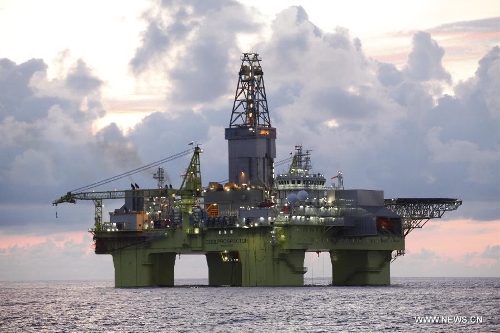HOME >> SOURCE
CNOOC-Shell joint venture sets tone for FDI inflows in 2020
Source:Global Times Published: 2020/1/14 21:40:53

Photo taken on June 13, 2015 shows the Xingwang deep-sea semi-submersible drilling platform at Liwan3-2 gasfield in the South China Sea, south China. China's largest offshore oil and gas producer CNOOC Ltd. announced on July 3, 2015 that its Xingwang deep-sea semi-submersible drilling platform has started drilling at 1,300 meters underwater level in Liwan 3-2 gas field in the South China Sea. (Xinhua/Zhao Liang)
China National Offshore Oil Corp (CNOOC) will team up with Netherlands-based Royal Dutch Shell Plc to build their first world-class industrial plastics facility in China, setting the tone for the increasing flow of foreign direct investment (FDI) into the Chinese market in 2020.
Shell Nanhai and CNOOC Oil & Petrochemicals agreed to build the factory at their chemical base in Huizhou, South China's Guangdong Province, to produce polycarbonate, according to a statement sent to the Global Times on Tuesday.
Polycarbonate is an industrial plastic that has transparency and temperature resistance advantages and can be widely used in sectors including electronic components, automobile parts and aerospace.
The announcement of the agreement came on the heels of Germany-based chemical company BASF kicking off the construction of a $10 billion smart Verbund project in Zhanjiang, Guangdong in late November. The facility is scheduled to be put into use in 2022.
In recent years, China's industrial upgrading, green development and the rise of emerging industries have helped boost the inflow of FDI. On Friday, 60 foreign investment projects broke ground in Shanghai, with a total investment of more than $7.2 billion. The projects cover sectors such as artificial intelligence, bio-medicine and vehicles. Nine have investment from Fortune 500 companies.
Meng Wei, spokesperson of the National Development and Reform Commission, said in December that she believed that a batch of large-scale projects in new energy, chemical industry and electronic information will break ground.
Wei Jianguo, a former Chinese vice commerce minister, said the total number of medium-scale foreign projects (above $1 billion each) is expected to exceed 1,000 in 2020 and foreign enterprises' stakes will continue to rise along with the shortening of China's negative list.
Market potential alone can't attract foreign investment, so China should continue to optimize its business climate by improving foreign investment convenience and implementing relevant policies, Li Chang'an, a professor at the Department of Public Economics at the University of International Business and Economics, told the Global Times on Tuesday.